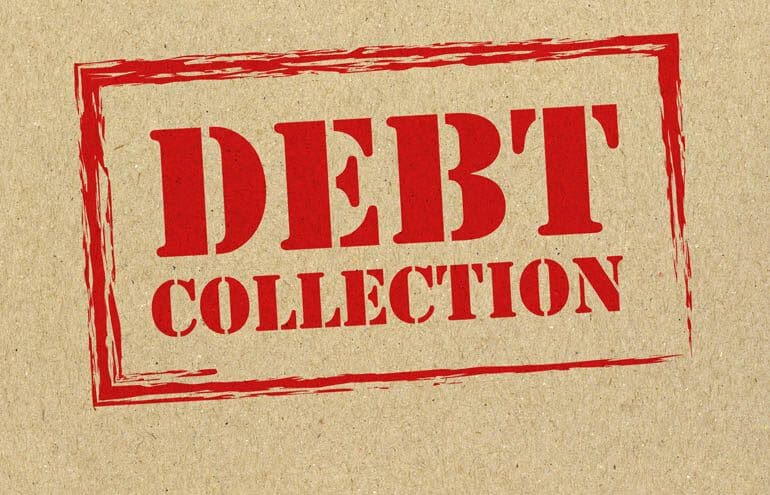Should you hire a collections attorney? Corrinne Viola answers all of Ruth Carter’s questions about getting paid what you are owed.

One of the most frustrating parts of being an attorney is going after clients who refuse to pay their bills. We can charge interest, limit our representation when possible, send follow-up letters and make phone calls. But if a client is ghosting us, it seems there is little we can do to get paid what we’re owed.
I’ve written and ranted about this topic before. We work our asses off for our clients, and we deserve to be paid for that work. As I’ve previously said, as long as the client is paying down their balance, I don’t care if it takes them months, or even years to do it.
But I hate how powerless I feel when a former client won’t pay or communicate about it. As a result of this frustration, when I set a yearly billing goal for myself now I also set a goal to collect the same amount. I’ve also significantly increased my retainer. I’d rather cut a client a check back at the end of the representation than chase them for payment.
Is It a Good Idea to Hire a Collections Attorney?
That said, for my clients who have racked up thousands of dollars in unpaid bills, I’ve wondered if it’s time to take it to the next level: collections. Truth be told, I don’t really know how collections work. So I sought out Corrinne Viola, a collections attorney at Jaburg Wilk, who agreed to shed some light on the topic.
Q&A With Attorney Corrinne Viola
Let’s start with the basics. What exactly do you do as a collections attorney?
Corrinne Viola (CV): I like this question because it gives me an opportunity to tell you that I do not simply sue people. In the collections world, having a claim does not necessarily mean one should move forward with a lawsuit. There are often reasons people stop paying their bills, and those reasons often affect the rights of creditors. I help my clients evaluate their options and view things from a “collectability lens.” The first question is: Does it make sense to sue this person?
Answering that first question involves answering a series of other questions: Does the potential defendant have assets? Depending on that answer, you can move on to the next step of the analysis, which involves, you guessed it, more questions! Are they willing to work out a payment plan? Will you spend attorney fees that you may never recover? Have they filed for bankruptcy, and was the debt discharged in bankruptcy? (Note that I’m going to use the royal “you” for my answers and refer to potential debtors as “they” or “potential defendants.”)
Answering the question of whether a potential defendant has assets is a tricky one. I engage a private investigator if the debt is significant. But if it is not, then you must consider what attachable assets the potential defendant has. This analysis is not as simple as checking the assessor for real property ownership. Let’s say they do own real property — what types of liens encumber the real property? Consensual liens nearly always take priority and are not subject to the homestead exemption. In other words, if they own real property, what kind of equity do they have? That often involves a title report, which is, again, costly.
If the potential defendant appears to be collectible, then I’ll move forward with a lawsuit. As a general matter, I don’t send demand letters in collection cases. Service of the lawsuit serves the same purpose — 99% of the time, they know they owe the money. You don’t need to remind them.
When should a lawyer engage a collections attorney to help with a non-paying client? I’ve heard the advice that you should take legal action against the client for payment after the statute of limitations for legal malpractice has expired.
CV: Not necessarily true. Are you, the lawyer, confident in your representation? If there are red flags, or you are concerned about some part of your representation, it does not make sense to sue for unpaid fees, because the former client may be entitled to an offset if they bring a malpractice counterclaim. I find it to be in poor taste to simply wait for the statute of limitations to run on a potential malpractice claim before suing for unpaid fees.
The former clients I have pursued for unpaid fees were given competent and effective representation. They simply stopped paying — for any of myriad reasons. Perhaps they did not like the judge’s ruling and they don’t understand why you cannot change it. Perhaps they did not appreciate that you would not take an action that they wanted you to take because it would violate an ethical rule or rule of law. Maybe they simply ran out of money. That happens a lot. But if you represented them competently, were well-versed in that area of law, regularly communicated with the client, and otherwise fulfilled your duty as their attorney, then there is no reason to run out the malpractice clock. As lawyers, any malpractice concerns should be immediately raised when consulting with a collection attorney.
How is using a collections attorney different from using a collections agency?
CV: It is different both in terms of billing and strategy for collecting payment. As a general matter, collection agencies do not pursue judgments. I usually pursue the judgment for the client, and then place it with a collection agency if post-judgment collection efforts are fruitless.
Why do I do this? Great question. In 2018, about a dozen attorneys general entered into a settlement agreement with the “Big Three” credit bureaus. That settlement agreement prohibited credit reporting of judgments unless (among other things) the credit bureaus update the information every 90 days. Credit bureaus don’t want to do that (it indeed would be a lot of work), so the end result is judgments are simply not reported on credit reports anymore. However, collection agencies, subject to certain regulations, can report to credit agencies. Credit reporting is often an effective mechanism to use when chasing payment.
What types of matters should or shouldn’t a lawyer send to collections?
CV: Lawyers should be very careful about retaining collection agencies. I use an agency that I have thoroughly vetted. Part of that vetting is discussing regular updates with respect to the Fair Debt Collection Practices Act, the Consumer Financial Protection Bureau or other consumer protection agencies. If the collection agency is up to date and well-versed in those areas, that is a good sign.
Ultimately, whether or not to send someone to a collections agency or attorney depends on the answer to many of the questions I posed above.
What kind of information should attorneys get from clients at the start of an engagement, so that if we have to send a matter to collections, the collections attorney will have the best chance of a good outcome?
CV: The best practice is to start off with a hefty retainer that you believe will cover all of your work. You should also get a good address: A P.O. box is insufficient. An email address is insufficient. A cellphone number is insufficient. You should gather all that information, but you should get the address where the potential or new client lives, not merely where they want to receive mail.
You should also be very upfront about the cost of representation — if there is any indication the client may not be able to pay your bill, ask for a bigger retainer.
In addition, you can gather other information throughout the course of representation. From what bank are they paying their fees? Make sure to retain copies of payment instruments. Where do they work? Are they a W-2 employee, subject to a wage garnishment, or are they an independent contractor? Are they subject to other garnishments? Do they owe unpaid child support? Where do they bank? These are all questions that often come up throughout the course of a representation. When you find an answer, be sure to make a note of it, whether you think you’ll need it or not. A good accounting department will also ensure this information is retained.
How often does a non-paying client file a bar complaint against the attorney in retaliation once the attorney has engaged you for help?
CV: It has never happened (at least, nobody has made a complaint that went anywhere). Knock on wood.
What type of outcomes should a lawyer expect?
CV: I’m going to beat a dead horse here, and tell you that the outcome depends on the potential defendant’s collectability. Sometimes collections is a waiting game — you record the judgment and wait for them to sell their real property. That may be in five years, 10 years or tomorrow.
If they’re subject to a wage garnishment, the lawyer can expect to receive payments whenever they are paid, assuming the wages meet requirements set forth in the garnishment statutes.
As to how long it takes before we can expect to have a resolution … it depends! If you file in Justice Court, you can get a judgment anywhere from nine to 12 months after filing. In Superior Court or federal court, as all likely know, the wheels of justice turn much more slowly.
Outcomes from collection efforts usually depend on the potential defendant’s collectability. Engaging a PI can be costly, but also makes things move much more quickly.
What other recommendations do you have for dealing with non-paying clients?
CV: The relationship between a lawyer and client is a fiduciary one — of course, we should also seek to act in our clients’ best interests (duh). But we have interests too, and we deserve to be compensated for our legal work. Working out a plan that works for both the lawyer and the client is usually the preferable outcome. But sometimes the client stops responding; as the kids these days say, you got “ghosted.”
You aren’t the first lawyer to get stiffed on a bill. For purposes of what I am about to say, I am assuming that you as the lawyer provided competent representation, and regardless of the outcome, you did the work, communicated with the client and performed your obligations. Let me now step onto my soap box:
You deserve to get paid. Whether you like the system or not, until we create a new one, money is how we compensate people for their labor. You did the work. Your time is valuable. We did not spend all this time and money on a J.D., bar dues and CLEs because we aren’t deserving of our fees. Do not be afraid to ask for a retainer. We do not work for free (even those who practice contingency work), and most lawyers don’t bill for all the time they actually spend working on or thinking about the case. I certainly am not the only lawyer who has laid awake in bed thinking about a case. You scrap, argue, write, research, read and sometimes cry behind closed doors. Or in front of a shareholder, which I have done.
Your reward is, hopefully, a good outcome and a returning client — but also a paid bill.
Thanks for the Valuable Explanations and Tips
Thanks to Corrinne Viola for sharing her wisdom and experience on this challenging aspect of practicing law! Except for collections attorneys, I suspect none of us got into the practice of law for the purpose of chasing clients to pay their bills.
















